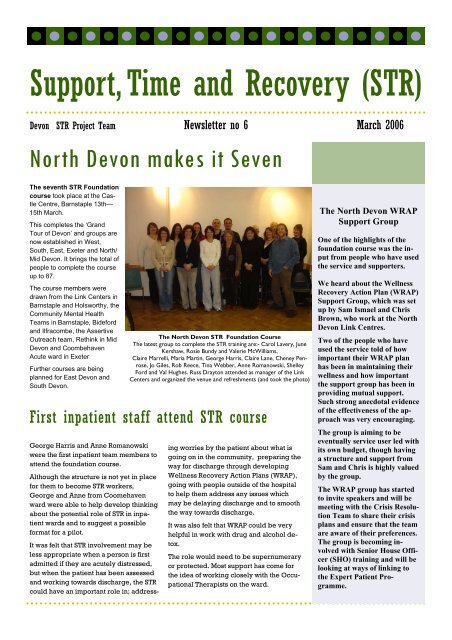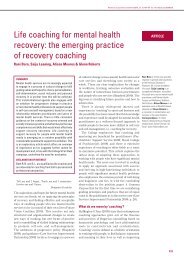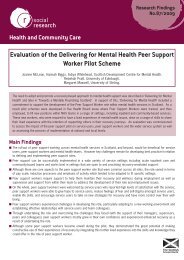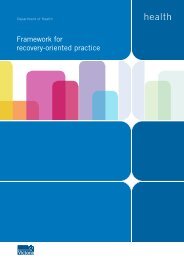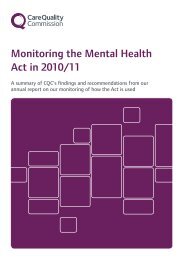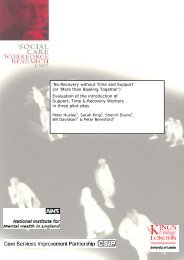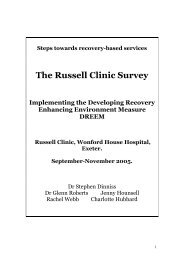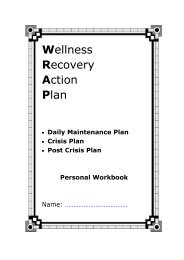STR Newsletter No 6 - Recovery Devon
STR Newsletter No 6 - Recovery Devon
STR Newsletter No 6 - Recovery Devon
You also want an ePaper? Increase the reach of your titles
YUMPU automatically turns print PDFs into web optimized ePapers that Google loves.
Support, Time and <strong>Recovery</strong> (<strong>STR</strong>)<br />
<strong>Devon</strong> <strong>STR</strong> Project Team <strong>Newsletter</strong> no 6 March 2006<br />
<strong>No</strong>rth <strong>Devon</strong> makes it Seven<br />
The seventh <strong>STR</strong> Foundation<br />
course took place at the Castle<br />
Centre, Barnstaple 13th—<br />
15th March.<br />
This completes the ‘Grand<br />
Tour of <strong>Devon</strong>’ and groups are<br />
now established in West,<br />
South, East, Exeter and <strong>No</strong>rth/<br />
Mid <strong>Devon</strong>. It brings the total of<br />
people to complete the course<br />
up to 87.<br />
The course members were<br />
drawn from the Link Centers in<br />
Barnstaple and Holsworthy, the<br />
Community Mental Health<br />
Teams in Barnstaple, Bideford<br />
and Ilfracombe, the Assertive<br />
Outreach team, Rethink in Mid<br />
<strong>Devon</strong> and Coombehaven<br />
Acute ward in Exeter<br />
Further courses are being<br />
planned for East <strong>Devon</strong> and<br />
South <strong>Devon</strong>.<br />
First inpatient staff attend <strong>STR</strong> course<br />
George Harris and Anne Romanowski<br />
were the first inpatient team members to<br />
attend the foundation course.<br />
Although the structure is not yet in place<br />
for them to become <strong>STR</strong> workers,<br />
George and Anne from Coomehaven<br />
ward were able to help develop thinking<br />
about the potential role of <strong>STR</strong> in inpatient<br />
wards and to suggest a possible<br />
format for a pilot.<br />
It was felt that <strong>STR</strong> involvement may be<br />
less appropriate when a person is first<br />
admitted if they are acutely distressed,<br />
but when the patient has been assessed<br />
and working towards discharge, the <strong>STR</strong><br />
could have an important role in; address-<br />
The <strong>No</strong>rth <strong>Devon</strong> <strong>STR</strong> Foundation Course<br />
The latest group to complete the <strong>STR</strong> training are:- Carol Lavery, June<br />
Kershaw, Rosie Bundy and Valerie McWilliams,<br />
Claire Marrelli, Maria Martin, George Harris, Claire Lane, Cheney Penrose,<br />
Jo Giles, Rob Reece, Tina Webber, Anne Romanowski, Shelley<br />
Ford and Val Hughes. Russ Drayton attended as manager of the Link<br />
Centers and organized the venue and refreshments (and took the photo)<br />
ing worries by the patient about what is<br />
going on in the community, preparing the<br />
way for discharge through developing<br />
Wellness <strong>Recovery</strong> Action Plans (WRAP),<br />
going with people outside of the hospital<br />
to help them address any issues which<br />
may be delaying discharge and to smooth<br />
the way towards discharge.<br />
It was also felt that WRAP could be very<br />
helpful in work with drug and alcohol detox.<br />
The role would need to be supernumerary<br />
or protected. Most support has come for<br />
the idea of working closely with the Occupational<br />
Therapists on the ward.<br />
The <strong>No</strong>rth <strong>Devon</strong> WRAP<br />
Support Group<br />
One of the highlights of the<br />
foundation course was the input<br />
from people who have used<br />
the service and supporters.<br />
We heard about the Wellness<br />
<strong>Recovery</strong> Action Plan (WRAP)<br />
Support Group, which was set<br />
up by Sam Ismael and Chris<br />
Brown, who work at the <strong>No</strong>rth<br />
<strong>Devon</strong> Link Centres.<br />
Two of the people who have<br />
used the service told of how<br />
important their WRAP plan<br />
has been in maintaining their<br />
wellness and how important<br />
the support group has been in<br />
providing mutual support.<br />
Such strong anecdotal evidence<br />
of the effectiveness of the approach<br />
was very encouraging.<br />
The group is aiming to be<br />
eventually service user led with<br />
its own budget, though having<br />
a structure and support from<br />
Sam and Chris is highly valued<br />
by the group.<br />
The WRAP group has started<br />
to invite speakers and will be<br />
meeting with the Crisis Resolution<br />
Team to share their crisis<br />
plans and ensure that the team<br />
are aware of their preferences.<br />
The group is becoming involved<br />
with Senior House Officer<br />
(SHO) training and will be<br />
looking at ways of linking to<br />
the Expert Patient Programme.
Page 2 Support, Time and <strong>Recovery</strong> (<strong>STR</strong>)<br />
Triggers, Early Warning Signs …. how to deal with them<br />
(Taken from the <strong>No</strong>rth <strong>Devon</strong> <strong>STR</strong><br />
Foundation Course WRAP Training)<br />
• Talk, talk, talk. Share, talk to<br />
someone you trust<br />
• Step back, reflect on the situation,<br />
decatastrophise,.Ground<br />
yourself, see the funny side. Take<br />
time out—go for a walk. Stop,<br />
think, start again, don’t panic.<br />
Challenge the feeling—remember<br />
you always have a choice. Reality<br />
check—putting things into perspective.<br />
Write things down. Rationalise,<br />
plan it, do it.<br />
• Look for a positive within a negative.<br />
Take what positive steps you<br />
can. Assertive confrontation and<br />
Support Time <strong>Recovery</strong> (<strong>STR</strong>) Worker -Implementation Tool for Managers<br />
The Care Services Improvement<br />
Partnership (CSIP) has produced<br />
an Implementation Toolkit for <strong>STR</strong>. It<br />
was dev eloped by the South East<br />
Region <strong>STR</strong> Leads Network.<br />
It includes sections on:-<br />
• The <strong>STR</strong> role, value base,<br />
recovery and the 10 Essential<br />
Shared Capabilities<br />
• Implementation—recruitment,<br />
process, system map, job descriptions,<br />
person specifications,<br />
education, employment<br />
and induction<br />
• Career development—the Career<br />
and Skills Escalator, Career<br />
Pathway, education,<br />
training and development and<br />
an ability assessment map<br />
• Competent framework—<br />
national occupational standards<br />
and the Knowledge,<br />
Skills Framework<br />
• Evaluation<br />
communication.<br />
• Have a cuddle. Pamper and treat<br />
yourself. Have a long bath. Plant a<br />
rose bush. Sex, chocolate and<br />
appreciating nature. Hug/stroke<br />
pet or friend/tree<br />
• Awareness of eating and sleeping<br />
patterns. Controlled breathing<br />
skills. Step back—chill. Visualise<br />
each morning. Mental activity.<br />
Stay off the smokes. Have a routine—break<br />
it.<br />
• Walk the dog. Writing, shopping,<br />
drawing—diversion. Sunshine,<br />
music, books, Time for self. DIY.<br />
Crosswords.<br />
The toolkit is a bit of a hotchpotch<br />
from the Policy Implementation<br />
Guidelines on <strong>STR</strong>, a variety of<br />
guidance documents from NIMHE<br />
and the Knowledge Skills Framework.<br />
It is clearly aimed at managers and<br />
has very little added value for practitioners,<br />
with the possible exception<br />
of the evaluation tools, which could<br />
be used in conjunction with the outcome<br />
measures based around the<br />
DREEM recovery makers being<br />
used locally.<br />
It identifies key areas for evaluation<br />
as:-<br />
• The views of service users<br />
• The views of carers<br />
• The views of other workers<br />
who work in the same mental<br />
health team as the <strong>STR</strong><br />
Worker(s)<br />
Sorry... I thought you said<br />
Tigger<br />
• The views of the <strong>STR</strong> workers<br />
themselves<br />
• The views of the employing<br />
organisations<br />
The <strong>Devon</strong> <strong>STR</strong> Project Team will<br />
consider using this format
Developing a <strong>Recovery</strong>-Based System<br />
Underlying<br />
Assumptions<br />
Human Givens<br />
Maximising independence<br />
Social Inclusion<br />
Operationalising<br />
Whole Life, Whole Systems<br />
Access<br />
Coordination<br />
Practical application<br />
Wellness <strong>Recovery</strong> Action Planning<br />
(WRAP)<br />
Expert Patient Programme<br />
(listening to experts by experience)<br />
Value system<br />
<strong>Recovery</strong> concepts and ideas<br />
Service user experience<br />
Person Centred Planning<br />
<strong>Recovery</strong><br />
Based<br />
System<br />
Approaches<br />
consistent with<br />
values<br />
Educational / life skills<br />
Solution focussed<br />
Motivational interviewing<br />
Community integration<br />
Evaluation<br />
DREEM<br />
Developing the workforce<br />
<strong>Recovery</strong> competencies<br />
Setting consistent standards<br />
Developing and valuing staff<br />
Support, Time & <strong>Recovery</strong> Workers<br />
The above representation is an early attempt to pull together the key elements of a recovery—<br />
based system. <strong>STR</strong> workers are the first group of workers to work to this framework. The model<br />
provides a value base from which to identify what beliefs, attitudes and competencies the <strong>STR</strong><br />
workers will work within. It looks at how these values translate into practice and how such a system<br />
could be operationalised and evaluated. Suggestions for improvement welcomed.<br />
Page 3<br />
“<strong>Recovery</strong> can be construed as a paradigm, an organizing construct that can guide the planning<br />
and implementation of services and supports with people with severe mental illness.<br />
The outlines of a new paradigm recovery-enhancing system are emerging. Such a system is<br />
person-oriented, and respects people's lived experience and expertise. It promotes decision<br />
making and self-responsibility. It addresses people's needs holistically and contends with<br />
more than their symptoms. Such a system meets basic needs and addresses problems in living.<br />
It empowers people to move toward self-management of their condition. The orientation<br />
is one of hope with an emphasis on positive mental health and wellness. A recoveryoriented<br />
system assists people to connect through mutual self-help. It focuses on positive<br />
functioning in a variety of roles, and building or rebuilding positive relation”<br />
From ‘What Helps and What Hinders <strong>Recovery</strong> ‘ http://www.namiscc.org/<strong>Recovery</strong>/2002/MentalHealth<strong>Recovery</strong>.htm
“I think most people, at least in the world I know,<br />
attempt to make sense of their lives, and when a<br />
profound experience (such as mental illness)<br />
strikes us, we struggle to make sense of that too.<br />
Why did it happen? What caused it? We may even<br />
impose an explanation. But sometimes there is no<br />
meaning– at least not one we understand. Then<br />
we have to put up with the pain of not<br />
understanding and eventually we have to put<br />
aside the need to know.<br />
What I began to understand through listening to<br />
the other’s stories and thinking about my own<br />
was that getting well and staying well depend on<br />
coming to terms with meaning. Ultimately we are<br />
able either to make sense of things or to accept<br />
that we cannot. I think this is a very important<br />
point because it has to do with getting peace of<br />
mind. It means we can stop asking, ‘Why did this<br />
happen? ‘And start asking, ‘How can I best deal<br />
with this experience?’ Julie’s Story<br />
What are <strong>STR</strong> workers concerned about?<br />
This a collection of some of the themes<br />
which are around for <strong>STR</strong> workers at present:- <br />
• The Day Opportunities Review.<br />
Although very supportive of the<br />
move towards individual recovery<br />
packages rather than day centres,<br />
there is a concern that babies are<br />
not thrown out with the bathwater.<br />
Some people find normal community<br />
facilities difficult and appreciate<br />
having somewhere to go where<br />
they feel safe. Drop in may still be<br />
an important option for some.<br />
• Primary Care. <strong>STR</strong> workers could<br />
have a lot to offer in a preventative<br />
role before engagement with a<br />
mental health service. A <strong>Recovery</strong><br />
perspective would suggest this<br />
approach, though current targets<br />
<strong>No</strong>tes from LEIBRICH, J. (1999) A Gift of Stories. New Zealand:<br />
University of Otago Press.<br />
Personal recovery stories which tell us about individual experience<br />
make ideas real and fill them with meaning. They show<br />
how a person tries to make sense of their world and offer their<br />
truth. Stories give us far more than information or knowledge –<br />
they offer the opportunity to understand something, to understand<br />
it from within.<br />
seem to be forcing more, not<br />
less people into secondary<br />
mental health services.<br />
• <strong>STR</strong> work offers a real opportunity<br />
to break the mould and<br />
work in creative ways across<br />
tradition boundaries. However,<br />
the system—financial and organisational,<br />
has to be in place<br />
to support flexible and responsive<br />
work.<br />
• All professionals need to share<br />
the recovery vision for the<br />
whole mental health system to<br />
deliver consistency.<br />
• It is important that service<br />
changes value the good work<br />
which is already taking place.<br />
Any change feels like a criticism<br />
WHAT DO THEY HAVE IN COMMON ?<br />
Steady consistent and trusting relationships<br />
A manageable relationship with the illness<br />
Someone to believe in the (well) person<br />
Acceptance and self-acceptance<br />
Creativity<br />
Spirituality<br />
Play<br />
Purposefulness and belonging<br />
Independence and self-control (freedom)<br />
Understanding of experiences and situation<br />
A rationale for recovery<br />
Nature – animals and gardens<br />
Personal solutions: finding / working out your own unique combinations<br />
(Extract from a summary by Dr Glenn Roberts)<br />
and has to be handled sensitively.


